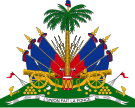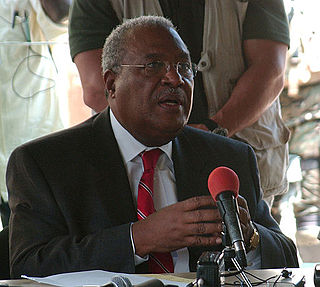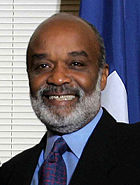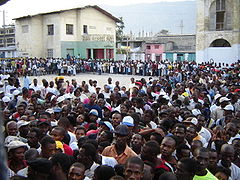
The recorded written history of Haiti began on 5 December 1492 when the European navigator Christopher Columbus happened upon a large island in the region of the western Atlantic Ocean that later came to be known as the Caribbean. It was inhabited by the Taíno, and Arawakan people, who variously called their island Ayiti, Bohio, or Kiskeya(Quisqueya). Columbus promptly claimed the island for the Spanish Crown, naming it La Isla Española, later Latinized to Hispaniola. French influence began in 1625, and French control of what was called Saint-Domingue—modern-day Haiti—began in 1660. From 1697 on, the western part of the island was French and the eastern part was Spanish. Haiti became one of the wealthiest of France's colonies, producing vast quantities of sugar and coffee and depended on a brutal slave system for the necessary labor. Inspired by the message of the French Revolution, Haitian slaves rose up in revolt in 1791 and after decades of struggle the independent republic of Haiti was officially proclaimed in 1804.

Jean-Bertrand Aristide is a former Haitian priest and politician who became Haiti's first democratically elected president. A proponent of liberation theology, Aristide was appointed to a Roman Catholic parish in Port-au-Prince in 1982 after completing his studies to become a priest of the Salesian order. He became a focal point for the pro-democracy movement first under Jean-Claude "Baby Doc" Duvalier and then under the military transition regime which followed. He won the Haitian general election between 1990 and 1991, with 67% of the vote and was briefly president of Haiti, until a September 1991 military coup. The coup regime collapsed in 1994 under U.S. pressure and threat of force. Aristide was then president again from 1994 to 1996 and from 2001 to 2004. However, Aristide was ousted in the 2004 coup d'état after right-wing ex-army paramilitaries invaded the country from across the Dominican border. As he claimed, the United States helped orchestrate the coup against him. Aristide was later forced into exile in the Central African Republic and South Africa. He finally returned to Haiti in 2011 after seven years in exile.

Fanmi Lavalas, is a social-democratic political party in Haiti. Its leader is former Haitian President Jean-Bertrand Aristide. It has been a powerful force in Haitian politics since 1991. Fanmi Lavalas governments advocate a policy of "growth with equity" based on Caribbean and Western European social democratic principles. Fanmi Lavalas governments have emphasised investment in education and health care as their priorities and have refused International Monetary Fund austerity measures.

Guy Philippe was a Haitian death squad leader and has attempted to become a political leader. He led the 2000-2004 paramilitary insurgency that culminated in the U.S. government's 2004 Haitian coup d'état ousting of Haiti's elected government and President Jean-Bertrand Aristide.
Jean Léopold Dominique was a Haitian journalist and pro-democracy activist. His station, Radio Haiti-Inter, was the first to broadcast news, investigative reporting, and political analysis in Haitian Creole, the language spoken by all Haitian people. He was assassinated on April 3, 2000, a crime for which the intellectual authors have been neither officially identified nor prosecuted.

Gérard Jean-Juste was a Roman Catholic priest and rector of Saint Claire's church for the poor in Port-au-Prince, Haiti. He was also a liberation theologian and a supporter of the Fanmi Lavalas political party, as well as heading the Miami, Florida-based Haitian Refugee Center from 1977 to 1990.
Marc Louis Bazin was a World Bank official, former United Nations functionary and Haitian Minister of Finance and Economy under the dictatorship of Jean-Claude Duvalier. He was prime minister of Haiti appointed on June 4, 1992 by the military government that had seized power on September 30, 1991.

Dumarsais Mécène Siméus is a Haitian-born and U.S. naturalized businessman from Texas. Simeus returned to Haiti to be a candidate in the 2006 presidential elections.

Parliamentary elections in 2000 were held in Haiti in two separate sets of elections, on May 21, 2000 and July 9, 2000, for all 83 seats in the Chamber of Deputies and nineteen seats in the Senate, and later that year, at the same time as November 26, 2000 presidential election for eight Senate seats. The legislative elections and presidential elections in the fall ran largely smoothly, however the first and second rounds of the spring elections generated the most controversy.

Michel Joseph Martelly is a Haitian singer and former politician who went on to serve as the President of Haiti from May 2011 until February 2016. He is from Côte-de-fer, a commune located in the South East region of Haiti. Martelly was one of Haiti's best-known musicians for over a decade, going by the stage name Sweet Micky. For business and musical reasons, Martelly has moved a number of times between the United States and Haiti. When travelling to the United States, Martelly mostly stays in Florida. After his presidency, Martelly returned to his former band and sung a carnival meringue entitled Bal Bannan nan, a message as a response to Liliane Pierre Paul, a famous Haitian female journalist in Port-au-prince.

Senate elections for a third of the seats in the Senate of Haiti were held on 19 April 2009, with a run-off to be held on 21 June 2009. Per the Constitution of Haiti, voters should renew ten of the thirty seats in the Senate, but as Pierre Emmanuel Limage, died in a car accident and Ultimo Compère and Rudolph H. Boulos resigned, there will be twelve open seats instead.

Robert Manuel is a Haitian political figure who was an unsuccessful nominee to the post of Prime Minister of Haiti in 2008.

General elections were held in Haiti on 28 November 2010, having originally been scheduled for 28 February. Ten senators and all 99 deputies were to be elected.

The 1987 Haitian general election took place on 29 November 1987, with a second round planned on 29 December. In these elections voters would have to elect the President, 77 deputies and 27 senators.
Leslie Delatour (1950–2001) was a Haitian economist who served as governor of the Bank of Haiti and Haiti's finance minister.

Jude Célestin is a Haitian politician who was one of two presidential candidates heading off to the second round in the 2015 presidential election race. After an education in Port-au-Prince, Célestin studied mechanical engineering in Switzerland. Before he was nominated as the presidential candidate for President René Préval's Unity (INITE) party, he was the executive director of the government's construction ministry, the National Center of Equipment.

Brignol Lindor, was a Haitian radio journalist and news editor, lawyer and teacher. Lindor was a prominent voice in politics, speaking mostly on behalf of the Democratic interests of the Haitian people. His brutal murder was blamed on threats from leftist politicians who supported President Jean-Bertrand Aristide.

















